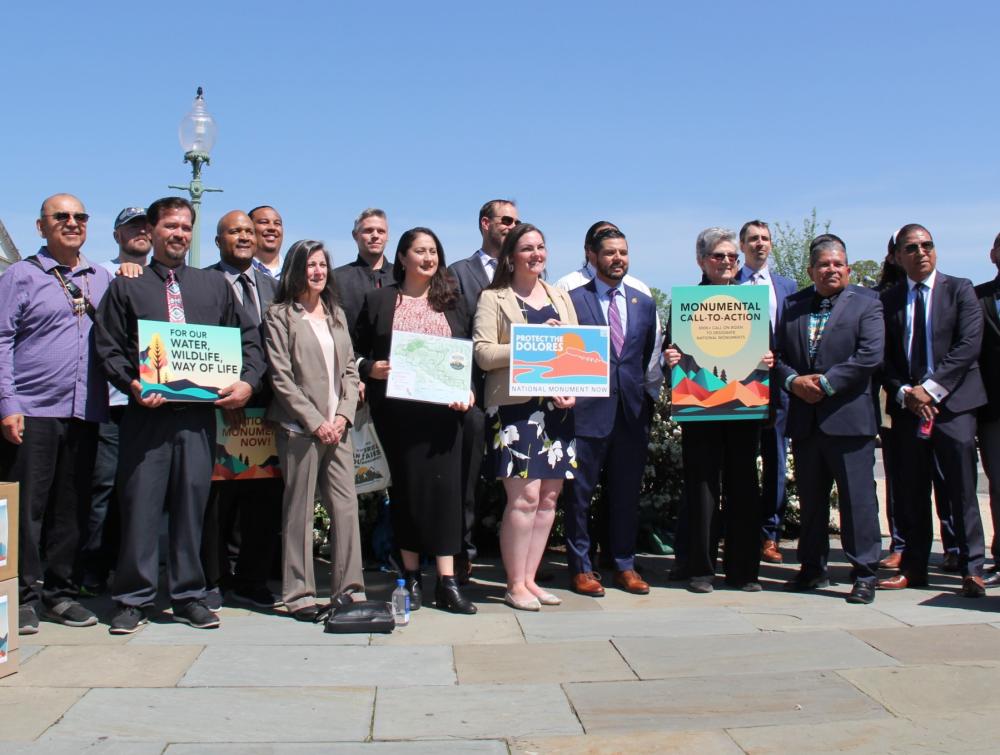More than 800,000 people ask Biden admin for monument protections

Tribal leaders, community leaders and Members of Congress at the Monumental Call to Action
Members of Congress, Tribal leaders, and community advocates are calling on President Biden to protect special places across the country
Today, in a momentous display of unity, Tribal and community leaders joined members of Congress from across the West to present a staggering 800,000+ petition signatures from people urging President Biden to use the Antiquities Act to designate and expand national monuments. This gathering underscores a shared commitment to protecting public lands and is a testament to everyday people's collective power and support.
Jordan Schreiber, Government Relations Director of The Wilderness Society, remarked, “The collective force of nearly one million signatures shows without a doubt that people across the country care about preserving natural, cultural and ecological heritage. President Biden has the authority to do so by protecting these special places. We’re looking forward to working with his administration to do just that.”
The “Monumental Call to Action” highlighted 11 community-led campaigns to preserve cultural, historical, and natural resources across seven states—Great Bend of the Gila in Arizona; the expansion of San Gabriel Mountains and Berryessa Snow Mountain (Molok Luyuk) national monuments, and designations of Chuckwalla, Sáttítla - Medicine Lake Highlands, and Kw'tsán in California; Dolores Canyons in Colorado; 1908 Springfield Race Riot in Illinois, Julius Rosenwald & Rosenwald Schools sites in Illinois and Maryland; Bahsahwahbee-Swamp Cedars in Nevada; and Owyhee Canyonlands in Oregon.
With the 53rd anniversary of Earth Day just days away, Senator Alex Padilla (CA), and Reps. Raul Ruiz, M.D. (CA-25), John Garamendi (CA-08), and Nikki Budzinski (IL-13); representatives from the Confederated Tribes of the Goshute Reservation, Fernandeño Tataviam Band of Mission Indians, and Fort Yuma Quechan Indian Tribe, Pit River Nation, and Torres Martinez Desert Cahuilla Indians; alongside community advocates, gathered on the steps of the House Triangle. Collectively, they represented three-quarters of a million people who are calling for the protection of these special places. Despite overwhelming public support—85% of Westerners support the creation of national monuments—no new monument expansions or designations have been made this year, which underscores the urgent need for action.
National monuments, beyond their symbolic value, offer tangible benefits. They can provide more equitable access to nature and also play a vital role in restoring America’s biodiversity and wildlife. Importantly, they hold time-honored stories for future generations, preserving our cultural and historical heritage. Furthermore, they provide an opportunity for co-management of ancestral lands and sacred lands if Tribes are interested, as outlined in the designation proclamation. A prime example of this is the freshly drafted Resource Management Plan (RMP) for Bears Ears National Monument in Utah, a collaborative, nation-to-nation effort between the Bears Ears Inter-Tribal Commission, Bureau of Land Management, and the U.S. Forest Service.
The Antiquities Act, passed in 1906, has been an effective tool for designating and expanding national monuments on existing public lands when land protection bills have stalled in Congress. Unfortunately, it’s increasingly rare that these valued places are protected through legislative action. Since the creation of the Antiquities Act, 18 presidents—9 Republican and 9 Democratic—have used this tool to protect iconic places throughout the country.
Media Contact:
Gaby Diaz
Communications Manager, Landscape Connectivity
gaby_diaz@tws.org / 720-394-3294 (cell)
